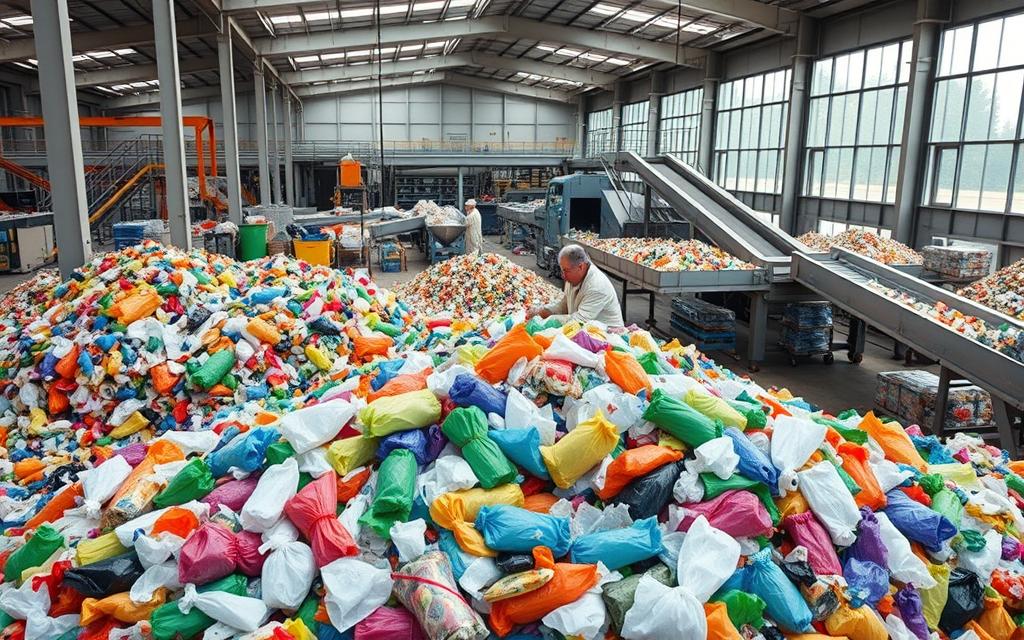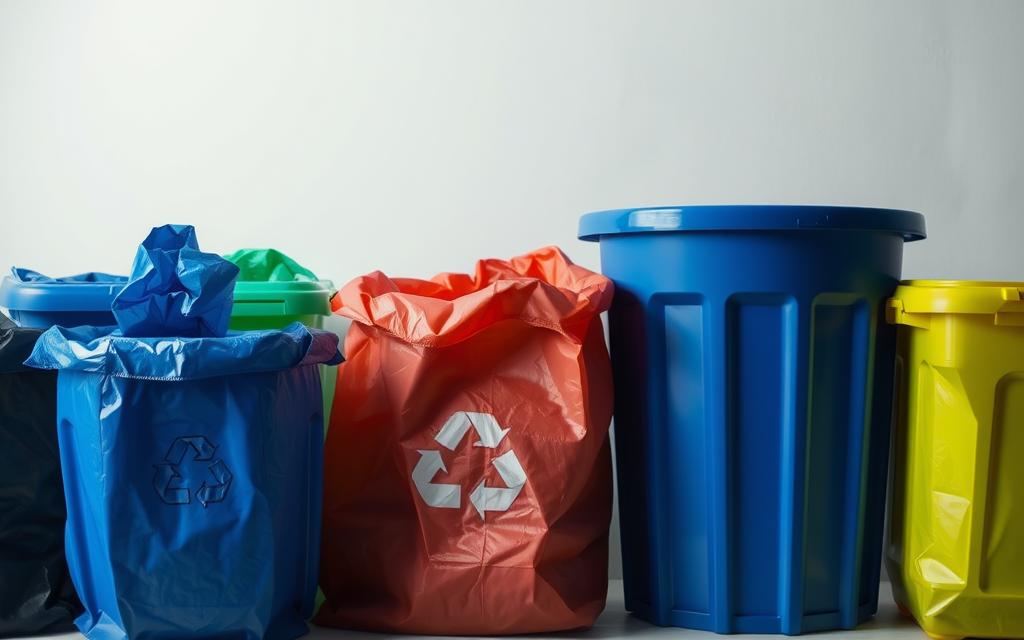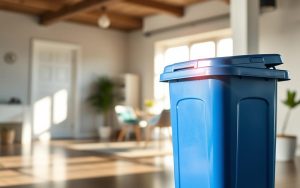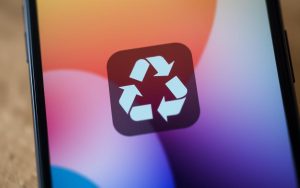Table of Contents
Many people believe tossing items into the recycling bin guarantees they’ll be recycled. This practice, known as wishcycling, often leads to confusion. Trash bags, for example, fall into this category. While they are technically recyclable, the process isn’t as straightforward as it seems.
Improper disposal of plastic trash bags can cause significant issues. They often end up in landfills or contaminate recycling machinery. Special handling is required to ensure they don’t disrupt the recycling process.
Several challenges make recycling these items difficult. Material composition, curbside recycling limitations, and consumer habits all play a role. Understanding these factors is key to making better choices.
Thankfully, eco-friendly alternatives to traditional plastic bags are available. Exploring these options can help reduce waste and support sustainable practices. Let’s dive deeper into the truth behind recycling trash bags and discover smarter solutions.
Understanding the Basics of Bin Bag Recycling
Recycling bin liners often raise questions about their environmental impact. To make informed decisions, it’s essential to understand their composition and the challenges tied to their disposal.
What Are Bin Bags Made Of?
Most trash liners are made from polyethylene, a type of plastic labeled as #2 (HDPE) or #4 (LDPE). This material is durable and flexible, making it ideal for holding waste. However, not all liners are created equal.
Some variants, like scented or antibacterial products, contain mixed materials. These additions complicate the recycling process, as they require specialized handling to separate components.
Why Recycling Bin Bags Is Complicated
One major issue is contamination. Food residue or non-recyclable items inside these liners can render entire batches unusable. Sorting facilities often reject bagged recyclables due to this risk.
Another challenge is their thin, flexible nature. Plastic films can jam recycling machinery, forcing shutdowns for maintenance. This not only slows down operations but also increases costs for recycling centers.
Understanding these hurdles is key to improving waste management practices. By choosing the right products and disposing of them correctly, we can reduce contamination and support efficient recycling efforts.
Are Bin Bags Recyclable? The Reality Explained
Not all plastic bags can be recycled through standard curbside programs. While they are technically recyclable, the process involves specific steps and limitations. Understanding these challenges is crucial for effective waste management.

Curbside Recycling Limitations
Most curbside recycling programs in the U.S. reject plastic bags. In fact, 95% of these programs do not accept them. The thin, flexible nature of these items often jams recycling machinery, causing costly shutdowns.
Additionally, contamination from food residue or non-recyclable materials inside the bags can render entire batches unusable. This is why sorting facilities typically avoid processing bagged recyclables.
Plastic Film Recycling Drop-Offs
Despite curbside limitations, plastic bags can still be recycled through store drop-off programs. These programs accept clean polyethylene films, such as grocery bags, bread bags, and plastic mailers. However, it’s essential to ensure the items are clean and dry to avoid rejection.
To find a drop-off location near you, visit Plasticfilmrecycling.org. Many grocery stores and retail chains participate in these programs, making it convenient to recycle responsibly.
| Eligible Items for Drop-Off | Requirements |
|---|---|
| Grocery bags | Clean and dry |
| Bread bags | Free of food residue |
| Plastic mailers | No stickers or labels |
By following these guidelines, you can help reduce waste and support efficient recycling efforts. Avoid using blue recycling bags, as they often end up in landfills due to processing issues.
Common Misconceptions About Recycling Bin Bags
Recycling efforts often face confusion due to common misconceptions about waste disposal. Many people unknowingly contribute to contamination by misunderstanding how certain items, like trash bags, should be handled. Let’s explore these misconceptions and their impact.
What Is Wishcycling?
Wishcycling refers to the act of placing non-recyclable items in the recycling bin, hoping they’ll be processed. This well-intentioned practice often leads to increased contamination rates. For example, using plastic bags to hold recyclables can cause entire batches to be rejected.
Contamination is a significant issue, with 30% of recycling streams affected by non-recyclables. Sorting facilities face challenges when trash bags jam machinery or contain food residue. This not only slows down operations but also increases costs.
Why Bin Bags Often End Up in Landfills
Despite efforts to recycle, many bags end up in landfills due to processing limitations. For instance, Chicago’s blue bag program was abandoned because the plastic films disrupted machinery and required manual removal, posing safety risks to workers.
Additionally, biodegradable or compostable bags aren’t suitable for standard recycling streams. They require specialized facilities, which are not widely available. This highlights the importance of understanding proper disposal methods to reduce waste effectively.
- Wishcycling increases contamination rates in recycling streams.
- Plastic films jam machinery, leading to costly shutdowns.
- Biodegradable bags aren’t compatible with standard recycling processes.
Eco-Friendly Alternatives to Traditional Bin Bags
Sustainable alternatives to traditional plastic liners are gaining popularity. These options not only reduce environmental impact but also support efficient waste management. Let’s explore some of the best eco-friendly choices available today.

Compostable and Biodegradable Options
Compostable bags are designed to break down in industrial composting facilities. Look for products certified under ASTM D6400 standards to ensure they meet composting requirements. However, these products are not suitable for standard recycling streams.
Biodegradable bags may seem like a good option, but they often require specific conditions to decompose fully. Without access to industrial composting, they may end up in landfills. Always check local facilities to confirm compatibility.
Reusable Bags for Waste Management
Heavy-duty reusable bags, made from silicone or canvas, are excellent for non-messy waste like paper or cans. They eliminate the need for single-use plastic and can be cleaned and reused multiple times.
For dry recyclables, consider lining bins with newspaper. This simple switch removes the need for plastic liners entirely. It’s a cost-effective and eco-friendly solution for managing waste.
- Choose compostable bags for wet waste only if paired with municipal composting.
- Opt for reusable silicone or canvas bags for long-term sustainability.
- Use newspaper liners for dry recyclables to reduce plastic consumption.
Conclusion: Making Informed Choices for a Greener Future
Every choice we make about disposal impacts the environment. To reduce waste, avoid wishcycling and opt for store drop-off programs for plastic films. Transitioning to reusable bags or compostable options can also make a difference.
Always verify local recycling guidelines through municipal websites. Policies vary, and staying informed ensures proper disposal. Advocate for improved infrastructure to handle trash bags and other recyclable materials more efficiently.
Consumer demand drives corporate sustainability. Supporting brands with eco-friendly practices encourages broader change. Small steps, like proper bin liner disposal, collectively reduce landfill waste and pave the way for a greener future.
FAQ
What materials are used to make bin bags?
Most bin bags are made from low-density polyethylene (LDPE) or high-density polyethylene (HDPE), which are types of plastic. These materials are durable but challenging to recycle.
Why is recycling bin bags difficult?
Recycling bin bags is complicated because they often contain food waste, liquids, or other contaminants. Additionally, their thin plastic structure can clog recycling machinery.
Can I recycle bin bags through curbside programs?
Most curbside recycling programs do not accept bin bags due to contamination risks and processing challenges. Check with your local facility for specific guidelines.
Where can I recycle plastic film like bin bags?
Many grocery stores and retail chains offer drop-off locations for plastic film recycling, including clean and dry bin bags. Look for designated bins at these locations.
What is wishcycling, and how does it affect bin bags?
Wishcycling is the act of placing non-recyclable items, like bin bags, into recycling bins with the hope they will be recycled. This can contaminate recyclable materials and harm the recycling process.
Why do bin bags often end up in landfills?
Bin bags frequently end up in landfills because they are not accepted in most recycling programs and are difficult to process due to contamination and material composition.
Are there eco-friendly alternatives to traditional bin bags?
Yes, compostable and biodegradable bin bags are available as eco-friendly options. These products break down more easily in composting facilities compared to traditional plastic bags.
Can reusable bags be used for waste management?
Reusable bags, such as those made from cloth or durable materials, can be used for waste management. They reduce plastic waste and are a sustainable alternative to single-use bin bags.









